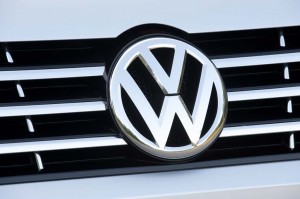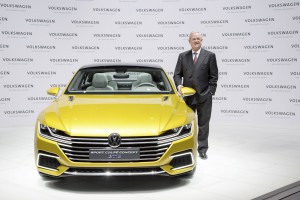Accused of cheating on emissions standards, Volkswagen and its upscale Audi brand have been ordered to recall nearly 500,000 diesel cars sold in the U.S. – but that is likely to be only the start of the problems facing the German maker.
Within hours of the announcement from the Environmental Protection Agency, several high-profile law firms had already weighed in, threatening potentially costly class action lawsuits. That’s on top of multi-billion dollar fines Volkswagen could be subject to. The maker may also be targeted by the U.S. Justice Department for creating a so-called “defeat device” to get around strict diesel emissions standards. The mounting list of challenges has already caused a massive sell-off of Volkswagen stock.
“I personally am deeply sorry that we have broken the trust of our customers and the public,” Volkswagen CEO Martin Winterkorn said in a statement issued over the weekend. “We at Volkswagen will do everything that must be done in order to re-establish the trust,” he said, adding that the maker will work openly with authorities investigating the alleged scam.
(For more on the VW diesel recall, Click Here.)
Winterkorn ordered an immediate halt to sales of affected models until Volkswagen engineers can come up with a fix for the problem.
VW has been offering consumers technology it claimed was clean, sporty and fuel-efficient. Diesel-equipped models like the Jetta and Golf have accounted for about 25% of the maker’s U.S. sales in recent years, and VW has been the leader in the reviving American diesel market.
But according to the EPA, a number of Volkswagen and Audi vehicles equipped with 4-cylinder diesel engines were programmed to detect when they were undergoing emissions tests. Otherwise, the software deactivated some of the onboard pollution control equipment. The process apparently helped improve performance but resulted in the vehicles emitting additional particulates and smog-causing oxides of nitrogen.
Neither VW nor EPA officials have yet said what it will take to fix the problem, though it is likely to start with changes to the onboard engine control software. The cost is expected to run into the millions of dollars. But that could be the least of VW’s financial worries.
For one thing, the EPA could fine VW as much as $37,500 for each of the 482,000 recalled vehicles that violated clean air rules. That would work out to more than $18 billion. And the California Air Resources Board, or CARB, could levy its own penalties. Under U.S. law, California sets its own, tougher automotive emissions standards.
(VW, Audi expect to “electrify” their entire line-ups. Click Here for more.)
Volkswagen is likely to also find itself in the crosshairs of the U.S. Justice Department, which has been taking a more aggressive stance on white collar crime, and has come down hard on the auto industry in recent years. It has levied major fines and sent a number of Japanese executives to prison for price fixing in the auto parts industry. In March 2014 it levied a $1.2 billion fine against Toyota for mishandling safety problems and last week accepted a $900 million settlement involving General Motors’ deadly ignition switch issue.
Significantly, the EPA last Friday described the VW recall as an “opening salvo” into a broader investigation, and noted it is cooperating with both the Justice Dept. and the State of California.
What is unclear is whether that implies that other manufacturers may also have developed ways to cheat on emissions tests. Diesels had all but vanished from the U.S. market starting in the early 1990s, regaining momentum only recently, and primarily through European brands such as Volkswagen, Audi and Daimler AG’s Mercedes-Benz.
“We heard of the EPA’s accusations against VW from the press. The issue described by the press does not apply to Mercedes-Benz Cars,” Daimler said in an statement e-mailed to reports. It noted it was not aware of any investigation involving its own products.
Meanwhile, the impact of the cheating scandal could stretch beyond U.S. borders. Michael Schroeren, a spokesman for Germany’s environmental ministry, told reporters in Berlin that authorities there intend to “check whether comparable manipulation has happened in Germany or Europe.”
While Volkswagen faces potentially serious problems with federal regulators and prosecutors, there could be a costly civil side to the cheating scandal. Several law firms that specialize in large class action cases have already announced plans to look into the problem. That includes Seattle-based Hagens Berman Sobol Shapiro LLP, which took on both Toyota and GM over their safety problems.
“The tinkering that Volkswagen will have to do by law to fix these vehicles will almost certainly degrade the performance to less than what Volkswagen claimed when it originally sold these cars,” said Steve Berman, a managing partner at Hagens Berman. He said that the use of a defeat device “blindsided” consumers who “went to great lengths” who wanted vehicles that were both clean and sporty.
Volkswagen is already paying a price for the problem. As of midday Monday, European investors fleeing the maker’s stock had already wiped out about 15 billion Euros, or nearly $17 billion in the maker’s market value. While the shares rebounded slightly late in the day, it was trading at roughly a three-year low of around 130 to 132 Euros, off as much as 20% from last week’s price.
Further revelations could have an even bigger impact, industry analysts warned.
The impact on the retail market could be the biggest uncertainty, however. VW narrowly nudged past Toyota to become the world’s best-selling automaker during the first half of 2015, a goal it had originally hoped to achieve by 2018. But it has been running into problems in recent months, particularly as the once-rapid growth of the Chinese auto market cools off.
VW has also had major problems in the U.S. where it has been counting on diesel products to attract buyers who want a more sporty alternative to Japanese hybrids like the Toyota Prius. Word that the company cheated to make its products look better could have a big impact on sales considering roughly one in every four vehicles VW and Audi sell in the States is diesel-powered.
(VW Tiguan gets complete makeover at Frankfurt Motor Show. Click Here to check it out.)
/2015/09/volkswagen-audi-expect-to-electrify-entire-line-up/



VW will have their hands full for quite awhile with this deal. If it is determined that some software engineer/programmer intentionally defeated the emissions devices vs. a coding error that causes the devices to malfunction, someone should go to prison and hopefully will.
This will be a lengthy investigation to determine which models have the problem and if it’s an isolated group or all models in a given production year, etc. as the software typically changes year to year. It should be interesting to see if the vehicles take a hit in mpg or not with the properly functioning emission controls.
I’m on VW’s side. I had a 2004 Ford 6.0L diesel that got a recall for too many particulates. My Ford dealer reprogrammed the ECU and I lost three miles per gallon that I never got back. When I complained to the dealer, he said every other owner of these trucks had the same complaint and it caused a lot of hard feelings. Of course, the 6.0L was not a good product anyhow. Lots of turbo failures, fuel injector problems and EGR failures.
VW has to meet emission standards LIKE EVERY OTHER AUTOMAKER. Why should they get to decide they’re above the law?
The next question is: what will they do about those folks who have these VW diesel, like them, and don’t want them fixed?
That’s a big question, Steve! I wonder if they’ll be forced to offer a repurchase program ala the one FCA launched in its consent decree with NHTSA.
Paul E.
Paul, I think you miss Steve’s point.
These cars are on the road, and they’re clearly illegal… i.e., not street legal for emissions.
Will an owner be forced to participate in some sort of recall?
Remember, he’ll pass emissions testing when tested, just not when driving around, so the existing methods to correct the issue won’t catch him.
-john
In terms of recall, owners will be asked to bring them back, no question. Recalls can be for safety or for emissions problems. As to a buyback, that is NOT out of the question.
Oh, and recall that the dynamometer testing process is usually used for fed-level compliance. State programs often use other methods.
Paul E.
The Feds can mandate that all vehicles be updated to meet the specs and consumers who refuse to do so can be fined or not be able to renew their vehicle registration, etc. There are legal means to force consumer’s to have their cars properly updated to meet emissions requirements – which they should do voluntarily anyways. Any reduction in mpg will likely be quite small – which is why it was dumb to disable the emissions devices.